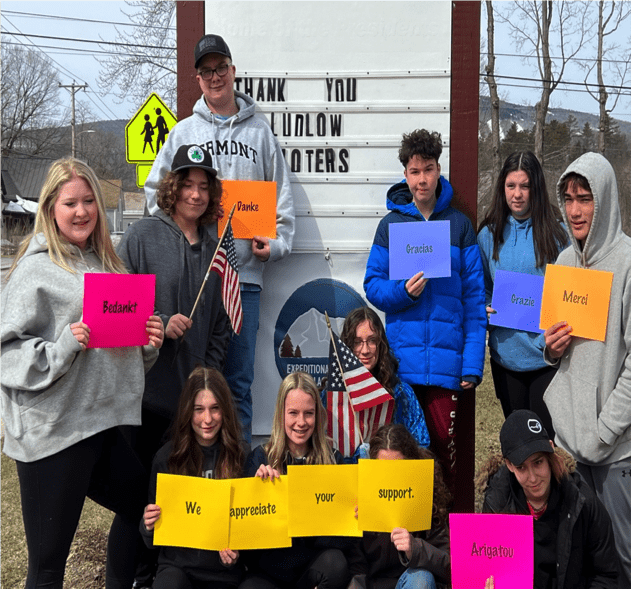LUDLOW, Vt. – The March 6, 2023 Ludlow Town Meeting was a phenomenal lesson in how democracy can work for the betterment of a community. Thank you to all who voted to help sustain the Expeditionary School at Black River’s (ESBR) vision, situated right here in the heart of Ludlow.

From its inception, creating a cost-effective financial model for educating youth that is more community-focused and locally controlled has been a priority of ESBR’s leadership team, who believe schools must be designed so that a student’s community can be their classroom. By creating a cost-efficient school, ESBR’s vision is to revitalize local economies and create opportunities for community engagement.
ESBR was founded as a reaction to the Act 46-driven closure of middle and high schools for the communities of Mount Holly and Ludlow, a vote that was cast based on the belief that it would improve outcomes and reduce costs. Five years later, the per-pupil expenditures across Vermont continue to increase, while outcomes across this state and throughout the U.S. school system continue to decline.
The “E” in ESBR stands for “expeditionary.” Famous Vermonter and education philosopher, John Dewey, captured how the expeditionary model is designed to achieve its educational objectives when he said “give the pupils something to do, not something to learn; and the doing is of such a nature as to demand thinking; learning naturally results.”
Similarly, having lived through World War I, Kurt Hahn set out to create a school where students would “do things, not listen to stern teachers’ lectures. It would be a school designed to help kids discover their interests and passions, not just prepare them for tests.” Hahn’s methods of instruction paved the way for the expeditionary learning (EL) model in the United States, which was formalized 30 years ago via a partnership between the Harvard Graduate School of Education and Outward Bound. ESBR’s curriculum development and strategic plans have been, and will continue to be, influenced by EL Education’s framework for school improvement.
Building on the policies mandated for schools that are currently funded by the State of Vermont’s Education Fund, Vermont’s Act 77 and EQS (2015) share the vision put forth in EL Education’s “We Are Crew: A Teamwork Approach to School Culture” by Ron Berger, Anne Vilen, and Libby Woodfin (2020). In 2020, when ESBR opened its doors, the school’s philosophy followed the precedents set by EL Education, which states “Schools need to be organized around the principles of social and emotional learning, not just the teaching of skills.” We could not agree more.
ESBR’s founding board members chose to anchor the school in the expeditionary learning framework because getting students out and about, learning in the natural environment, is a strategy for developing both social and emotional learning skills.
ESBR is a State of Vermont recognized independent school that has been philanthropically funded to date, having received $0 from the State of Vermont’s Education Fund. The initial application for approval to have school choice tuition dollars from students residing in school choice towns was submitted in July 2021. Nineteen months later, in December 2022, the Vermont Agency of Education (VT-AOE), the entity overseeing the Independent School Approval process, ordered ESBR’s leadership team to submit a second application and start the approval process over again.
The entire initial review process never once engaged the voices and perspectives of the parents and students choosing to attend ESBR. A decision was made without any dialogue with the constituents who contribute to the education fund. The families choosing ESBR continue to pay taxes, yet that contribution does not follow their children to the schools those parents and guardians have identified as being in their children’s best interest. Typically, evidence of continuous improvement is factored into the final decision to approve or not approve. That wasn’t the case for Ludlow’s community-based school. Ludlow’s vote to give $75 thousand to help bridge the gap between now and when ESBR’s second application is complete reminds us that local control is where meaningful change occurs.
The outcome of this year’s town meeting tells us that community-based schools make a difference in the lives of those living near them. It underscores the importance of making sure an affordable, high-quality learning experience is accessible to all students and their families.
Thank you again for endorsing our efforts and for believing in the positive impact ESBR has on this region, and on current and future generations of students.
To get involved, and for more dialogue, contact Kendra Rickerby, the head of school, at krickerby@esblackriver.org.